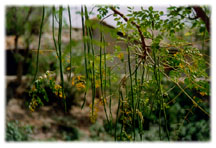All children deserve a quality education. Together, we can help them reach their dreams.
Learn more about Teach for Life, the educational branch of Trees for Life.


Moringa leaf powder can be used as a tea, added to beverages, sprinkled on food or taken in capsules. It can be used in cooking, but high temperatures destroy some of the nutrients.
A teaspoonful or so can be placed directly under the tongue and washed down with water, but care must be taken not to breathe the fine powder.

Moringa pods can be cooked in a variety of ways. Until they become too woody to snap, they can be cooked much like green beans or asparagus.
back to Using Moringa

Moringa seeds are used as a coagulant. They are known to separate out the solid particles from a colloidal water solution. However, if bacteria or microbes such as E. coli are present, Moringa does not work as a purifying agent. The water will need to be treated for pathogens to make it potable.

We at Trees for Life cannot advocate or suggest Moringa as a treatment or cure for specific conditions or diseases. Modern research has found that Moringa leaves, as well as other parts of the tree, have been used since ancient times in systems of traditional medicine in several cultures. Moringa has been used for inflammation, malnutrition, wounds, diabetes, iron deficiency, high blood pressure and other conditions. A few relevant references follow.

Trees for Life is not affiliated with any of the manufacturers of Moringa products. We do not have an official opinion of their products.
Our interest is in spreading the word about the nutritional benefits of Moringa and sparking much-needed scientific research.
back to Using Moringa
Moringa leaves have not been found to be toxic. Very extensive health and safety studies conducted at the Noguchi Memorial Medical Research Centre in Ghana determined that Moringa leaf powder has no toxic elements. Absolutely no adverse side effects from even the most concentrated Moringa diet were observed.
See this page from UNESCO for more information.
back to Using Moringa

Moringa leaf powder can be made by grinding dry leaves in almost any type of grinder that is available. The dry leaves can also simply be rubbed against a fine screen.
back to Using Moringa